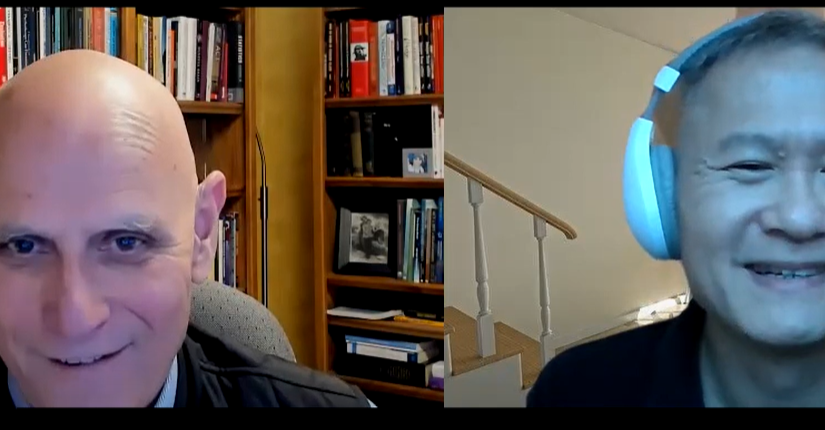Tag: Counseling for Anxiety
Not Everyone is a Zelensky, Not Everyone Ends Up a Hero
by Nathan Chua
How many times have you and I been discouraged at the results of our hard work? How many times have you and I loved but failed? Have you ever taken care of a stray puppy and ended up seeing that puppy die in just a few months? Have you ever done something that you thought would benefit your organization but end up unappreciated?
Welcome to the club my friend. This is something that you share with countless others who have lived long enough to experience the pain of the human condition. Oftentimes, we get disheartened by the results of our hard work and our standing up for what we believe is important. This could be mostly because we often miss seeing the value behind the goals that we set for ourselves. Goals are guideposts that tell us that we are heading in the direction we want for our lives. Goals are benchmarks we either look forward to or look back on with much pride and sometimes with mixed feelings. Goals are also not a sure thing. They can be elusive or even unachievable in our lifetimes.
Our values on the other hand, are qualities of being that we aspire to be about. It is inexhaustible. It does not have an end point that we either look ahead to or look back on. It can be the fuel that burns the fire for our daily existence that could otherwise be meaningless or pointless.
As we live our values and pursue those goals, not all of us will end up getting the acknowledgement we want. Not all end up on the cover of Time magazine like the president of Ukraine, Volodymyr Zelensky. Even in such challenging places like the Ukraine, many soldiers in the Ukrainian army or even civilians, have bravely stayed to fight for their territorial rights, but unlike their president, many of them will die unknown. At best, their names might be engraved in some memorial one day, but how many of us really take the time to get to know each one of these heroes.
Ask yourself this question, regardless of the results of your small but heroic endeavors, whatever your lot in life, would you still do what it is that you just did? If you were to dedicate most of your adult life to something you want to do, and no one would know, what would you choose to do? Maybe you can relate to these stories:
- A security guard earning what can hardly be called a living wage, returns a bag full of cash to an unsuspecting tourist;
- A homeless person rushing in to save another pinned underneath a burning car;
- A dedicated worker who contributes daily to their organization without much recognition or reward but a measly salary.
So let’s get back to the questions that I started this article with. Read them again and ask yourself, would you have still done it? Would you have still worked hard to help the group of people who toil with you everyday in the office? Would you still have loved that person the way you did? Would you still have taken that stray puppy? Would you still have done that for your company regardless of the results?
If your answer is yes to any of these questions, then welcome to the club again my friend. You are in the company of the nameless soldiers who died in war for the sake of something bigger than themselves. You may not end up a Zelensky or on the headlines of a broadsheet, but you stood for something you wanted to be for that moment.
If you ask me why we do it? Blame it on Darwinian evolution. There is a part of us that has never left us in millions of years of evolution. We are the most social of all primates. We have that gene, that social gene that tells us that we are capable of doing caring things even at the highest of costs, with little reasons for these deeds than just being the creatures that we are. That’s the kind of programming we have, fortunately or unfortunately. We can do really big things, for nothing more than love.
Listen to this post on Spotify! Click here! Or watch it on YouTube! Click here!
The ACT Matrix Video!
Hi Friends!
Here’s my version of explaining the ACT Matrix!
Hope you like it!
Successful But Unsatisfied
by Nathan Chua
Do you sometimes get that gnawing sense that you seem to have all the trappings of a happy and successful life, but feel an empty void inside nonetheless? Have you felt that life has hit a ceiling and you’d never get to a point where you have reached your full potential? Does it seem like you have made very logical decisions in your life and have come to a point where there is nothing more you can do? Have you gotten congratulatory messages from people that were important to you, but somehow feel like you have done this not out of your own wishes, but only to earn the respect and regard of those around you?
This is the last of a series of articles about Relational Frame Theory or RFT. The phenomenon described above is called reaching an adaptive peak in RFT terms. Some of us may have had this experience in our personal journeys through large chunks of our time. Here are some examples of how this might manifest in your life:
- You’ve gained a lifestyle level that feels comfortable but nonetheless leaves you unfulfilled.
- You’ve been living with an abusive partner who has nonetheless given you the comforts that you want for yourself and your kids.
- You’ve performed well in your work but also had to ingest chemical enhancers for many years.
If you find yourself in these situations, then maybe you are reaching high points in your life with the accolades that you receive, but still feel like you have not gone toward who or what you want to be.
Here is a direct quote from the book, “Mastering the Clinical Conversation,” by Hayes, Villatte, and Villatte, containing questions you might want to ask yourself and see if they can motivate you to move in a different direction:
- “As you’ve focused more on that goal, do you have a sense you’ve put your life on hold? Like life itself can start after this goal is achieved?”
- “It seems that it has had some payoff—some benefit. The question is, is that payoff worth all this energy invested in it?”
- “If you back up and look broadly, is this the kind of life you wanted to live? Are there any things you deeply care about that you have pushed to the side or put on the shelf?”
If you have heard some stories about people getting to a level of success in their lives and they suddenly surprise you about a sudden move to another career, this is what you might have witnessed. If you are like me, we can sometimes get caught up in achieving goals and forget what qualities we want to live.
Here is a question I would like to ask you and see if this strikes a chord with you: How old is this thought that you need to pursue these outward signs of success? Maybe you came from a difficult past as a child. Your family could barely make enough to pay the monthly mortgage or rent. Have you gone away from some of your deeply held dreams in the pursuit of acknowledgement and material security? If your answer is yes, then you might have hit an adaptive peak or a ceiling in your life. It is understandable because these successes do pay off in the short term.
Your next step would be to examine yourself and see what it is that makes you tick. When do you have a sense that life is moving in the right direction? If you sense that being a creative artist or a dutiful teacher is what you want to be, take small steps in that direction. Find something creative or helpful to kids that you can do within your current setup. Experiment if this works for you and see where it takes you, because you’ll never know what life awaits you on the other side.
The Chess Metaphor for the Mind!
I don’t know what I want to do with my life!
by Nathan Chua
I often hear this said to me by clients who feel like they can’t figure out how they want to spend their limited time on this planet. I can understand how difficult it is. Having spent much of my earlier years in my career doing stuff that I didn’t really like, it took me a midlife crisis to realize I was going on the beaten path that others expected of me. In my studies in ACT or Acceptance and Commitment Therapy, I have learned the importance of the plumbing underneath the approach that I am using. The plumbing I am referring to is Relational Frame Theory or RFT. In RFT terms, doing what is socially acceptable is called pliance. Many of us do what other people expect us to do in our lives. I have first hand experience!
There are also ways that our minds can get in the way of us finding more effective approaches to how we spend our time. These happen when we follow certain rules that eventually lead us to dead ends. Sometimes these rules are inapplicable or inaccurate. Sometimes some of these rules lead us to short term gains to the detriment of our longer term goals for life. Some rules keep us from breaking a glass ceiling so to speak, where we get rewarded with choices that ultimately limit what we are capable of accomplishing.
This will be a long piece if I discuss them all. Hopefully, I will be able to come up with a series of posts that can go through each one. Let’s start first with something that I am sure many of you have experienced. It is quite often that we hear stories of people going into careers only to get the authority figures around them off their case. I am quite sure you would get it if I gave a few examples.
- The college student who is taking a major only to keep their parents happy and worry-free about their own futures, at least financially.
- The employee who feels that their job is not what they expected it to be. Very little satisfaction is obtained after a few years and sadly, this could stretch into decades.
These are examples of pliance. We all at times make choices that are meant to please others or to be socially acceptable. It is not always wrong to do so, but if brought to an extreme, it can lead to questions about life’s meaning and purpose such as that question posed in the title of this article.
If you find yourself dissatisfied with life and want to know if you are on the right track, here are some helpful hypothetical questions to ask yourself as written by Drs. Steven Hayes, Matthieu Villatte(my friend and consultant), and Jennifer Villatte in the book, “Mastering the Clinical Conversation: Language as Intervention.” If you were an unhappy student and feel like you are just out there performing for your parents, here are some good questions to ask yourself:
- If your parents would approve your choice of major no matter what it is, do you think your current major will still be your choice?
- If no one knew that you were going to school, what course would you take?
- If you were successful at doing what your parents expected you to do but could not tell them about it, what would you do?
- If you turned into somebody other than yourself, what would you want to be doing?
If you have answers to these questions, then this could mean something in determining how you want to spend the rest of your life.
What I didn’t get to ask Steve
by Nathan Chua
If you were me and you were about to talk to one of the living legends of the field you work in, you would probably be laser-focused on what you would ask them when the moment finally arrives. Well, lucky me, I got a once in a lifetime opportunity to interview Dr. Steven Hayes, and my internet connection at home happened to be having problems for about a couple of months already. It was an interview, three months in waiting! My internet connection had been reliable for the most part of many years, and it chose the worst time to act up!
There were also severe financial challenges that had been surrounding me since the beginning of the year. And of course, I forgot to turn on the extension socket where my laptop was plugged so I could charge during what turned out to be a two-hour interview! It was, after all, akin to a live interview since I didn’t know how to edit video materials. So what could go wrong, did go wrong!
To avoid a monumental mishap, I woke up four hours (4 AM folks!) ahead of schedule, took a look at the speed of my internet connection and it was not even ten percent of the speed that I had been paying for. Having been prepared for the worst case scenario, I still had time to drive up to my office and do the interview there.
So as you can see I was flustered on the lead-up to the interview date most especially because I had been having connectivity problems since February of this year! I was so focused on getting the logistics right that I had forgotten to take down a question that I had in my mind as early as three months ago, when Dr. Hayes, through the kind assistance of David Lorscheid, gave me an affirmative response for the interview. That question could have been the last question I would ask and a fitting ending to the interview. It is related to what we do in the study of human behavior and what keeps us going even when it’s hard.
So for those of you who might be interested enough to follow what happens after a once-in-a-lifetime opportunity like this, here is the question, and probably the most important one, that I forgot to ask Steve!!!
Question I forgot:
I was particularly moved by the way you ended your book, “A Liberated Mind.” For those of you who have the audio version of the book, there is a bonus at the epilogue. The voice of the narrator suddenly changes into that familiar raspy voice of a wise man in his seventies as he reads what could be the main thing that he’s dedicated his life’s work to and how it could be summed up.
“Humanity is in a race, a race to create a kinder, more flexible and values-based world—to say it another way, a more loving world that is better able to face the challenges that our own scientific and technological developments present to us. Either we will learn how to create modern minds for this modern world of ours, or we will loom ever closer to disaster…
None of us knows how it will turn out, but based on human history, I put my bet on the human community evolving to meet the challenge. I put my bet on our capacity to choose love over fear. That can only happen one person, couple, family, business, and community at a time. When each of us learns how to put our own mind on a leash, and become more able to open up, show up, and move forward toward what we deeply care about, we shine a light into the darkness that helps others do the same. There is a good word for it: the word is love.
We know how important that is. The crying eight-year-olds within us know. Deep down, we all know that love isn’t everything, it’s the only thing.”
There you go my friends, for all their faults and follies, the work of Dr. Hayes and countless other scientists in human history, can at times be at best, misunderstood and at worst, neglected or even scorned at. The work that he does in the helping business is to make a better world for all of us to experience. A lot of it can be buried underneath these tail-chasing conspiracy theories that researchers and scientists have some kind of hidden notorious agenda in an age where people can be isolated in their own silos of information.
I had a follow up question in mind too: “Could I say that part where you say this is all about love is why you called it Acceptance and Commitment Therapy?” I have seen Dr. Hayes make a joke about the reason behind the name. He would say that he wanted it to be the first in the list of hundreds of approaches and models of therapy. My guess is, the name actually represents with a modicum of words, what love is all about. For love is after all about acceptance and commitment, isn’t it? Well, so goes my one and only chance to get confirmation about this idea.
Like Dr. Fauci or any other advocates for science you and I have seen across thousands of miles, Dr. Hayes has dedicated his life to his work because love matters to him. The bottomline behind the countless hours these people spend in their labs is love, because science is love. That’s what it’s all about lest we forget. Thank you Dr. Hayes for your love for science and the people that your work serves. We have a better, kinder world because of your dedication to something that could still use more appreciation from all.
Coping with Tunnel Vision During a Crisis
by Nathan Chua
I am quite certain that most if not all of you, my readers, have experienced being caught in a difficult situation and having to focus mainly on the problem at hand. When there is a crisis, we often develop tunnel vision and end up doing greater harm to ourselves and others. For example, when your teenaged child comes home really late, tunnel vision can lead a parent to think that the child doesn’t care and that the only solution is to show your anger in order to keep them in line. These situations don’t usually end up well. Often, what could have been a moment of tenderness and bonding, turns into a messy fight.
Now don’t get me wrong. Tunnel vision is not always harmful. There are plenty of times when you and I need it. If your toddler suddenly feels the urge to go towards an open window and tries to climb over it, tunnel vision will help you get your child out of that precarious situation. In these instances, following the dictates of your mind works well for you and the survival of your child. If there was a wild animal chasing you thinking you are prey, tunnel vision is what you need in that moment to come out of it alive.
The topic I’d like to discuss here is about the times when developing tunnel vision and instantaneously acting on it, may not be a move in our best interest. A timely example would be that incident when we saw a famous actor in Hollywood come up to a comedian in front of millions of people watching the Annual Academy Awards for motion pictures. We can say that Will Smith developed tunnel vision in the heat of the moment. Although the context of the moment would certainly make hurt feelings understandable, standing up and committing a violent act is the proverbial solution that becomes the problem.
On a larger scale, think about the war in Ukraine. That tunnel vision can cause egregious acts done against our fellow humans. To use an example closer to home, how many times have we seen road rage cause tunnel vision, rendering someone who has no record of violence helpless enough to physically or emotionally harm or even kill someone for a slight.
So here are some ways that I borrowed from Dr. Steven Hayes’ book, “A Liberated Mind,” that could be helpful for us to cope with tunnel vision when it occurs. In my opinion, it is but natural for us to get into that mode of mind, it only takes some mindfulness in the moment to avoid as I had mentioned earlier, making the solution become the problem.
- Try to sense in your body where you feel this current issue is affecting you. Is it a heaviness in the chest? Does it feel like a weight on your shoulders? Tightness in your head? Notice these sensations and give it a good clean yes. Give yourself a minute to experience this without defense.
- Have you seen anyone you cared for in your family who had suffered something like this? Recall that moment and see if you can purposefully witness their struggles with compassion.
- Say yes to the thoughts that come with this problem. See if you can drop any kind of struggle with it and notice them for what they are, just thoughts.
- Is there something here that you can learn from if you project yourself into the future? Is there something in this experience that can help you learn something about your life’s journey?
- See if you can find out why this is so painful for you. Behind anything that hurts you deeply, there could be the values you hold dear. Maybe you’re hurt because you care about honesty or openness. Maybe you are angered because of your love for justice. What could be the loving and caring thing to do at this moment?
- If this was a story in a book you were writing about a hero’s journey, what could this moment be for your hero? How can this moment make your hero become wiser and more alive?
- Do you have other memories attached to this present problem of yours? Can you willingly say yes to just one more of these?
- If there’s someone that you blame for this, can you think of times that you may have done something similar to what they’ve done to you, even if it was in a less hurtful way? Sometimes we point our problems towards other people and avoid seeing how we have in the past behaved in the same way.
- If you had a friend who had this problem, how would you feel towards them? What would you suggest they do?
- You have picked something that your mind says you have to say no to or that you shouldn’t have. Is there something that’s hard for you to give up in order to let go of that no? Perhaps saying yes to the hurt feelings would indicate that you are a weak person. Can you give up that struggle with that thought and allow that to be there just as a thought?
- If you could have these thoughts and feelings without having to fight them, what would you be able to accomplish in your life? Think about taking this along for the ride of your life or the journey you set out for yourself.
That’s all for now folks. Hope this will give you a wider perspective every time your mind gives you that urge to go into tunnel vision.
Climbing the Mountain of Your Life
by Nathan Chua
Have you lost hope recently? Does it feel like you have hit a ceiling in your life? Does it feel like everything is just one dreadful day after another? Has life turned into a series of musts, shoulds, and can’ts? Are you tired of running away? Perhaps running away from a life that you had always wanted? What is left to pursue with your time?
Whether it’s an addiction, anxiety, depression, or whatnot, it’s probably time to change your perspective on what’s going on with your life. If feeling safe is what you had been looking for in a long time, then you might notice that it is only a matter of time when your anxiety, depression, addictive urges, or anger catch up with you. It’s a fruitless endeavor. Why? Because you had been hardwired to have them. To what extent will depend much on your personal history. Unfortunately, no matter what, your personal history is going to be with you. Your memories are not your roommates that you can avoid by just picking another place to stay.
Clients who start gaining the ability to move forward in their lives would often run back for help whenever there are new challenges that come or when these obstacles feel insurmountable. Well, here is something that might encourage you. Let’s say you are a mountain climber. As you climb up that mountain, you would probably feel the challenges getting more daunting. Why? Because the higher you go the harder your fall will be. You also notice that you begin to have some bruises or more tired muscles as you reach one milestone after another. Your supplies may also show that you have less of what’s left as you climb. There may also have been unexpected delays or injuries that needed more time to heal.
Such is life when you go after what it is that gives it meaning and purpose. Success or no success, what’s important is the climbing. I mean you probably wouldn’t exchange the experience with just having a drive up the mountain in a nice SUV.
You might be reading this and think about what this has got to do with your problems. Let’s say you have the dream of finding a partner that you can love. You may fail along the way. Not all your relationships end up with an exchange of vows. The other end of this journey could be finding the person with whom you want to spend the rest of your life. Either way there is one common denominator in this pursuit of a meaningful relationship. You want to be in a relationship because you want to love and care for someone. And this doesn’t change regardless of outcomes, but the challenges can change and become even more challenging.
Another example is, you might be working hard for your dreams of sharing the fruits of your labor with people you care for. Bottom line is you probably are not working for money for the sake of one day lying down on top of it. You probably want to use this money for the people that matter to you, including yourself and maybe that sense of being independent. Whether you succeed or not in making the level of income you want, it would not change the fact that you wanted to be generous with what you earn. So the outcome doesn’t really change who you are and what you want to be. That’s a constant companion. They are your dreams and aspirations of being the person you want to be and living the life you want to live.
So let that mountain that I just stuck in your mind be your guiding metaphor. As you climb higher towards your dreams, you will have new and more difficult challenges that will come. Learning how to embrace them as opportunities to continue with your mission is the key. It is not about results, it’s about you and your dream of just being what you want to be in every step of your way there.







